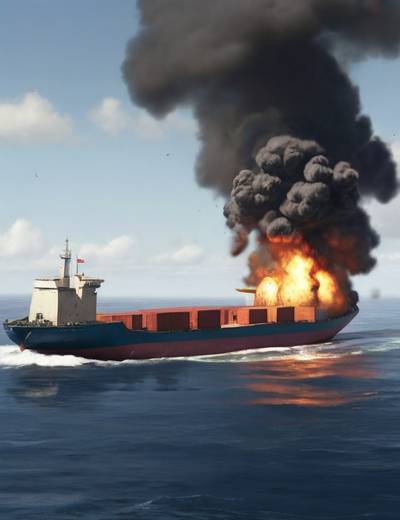Global Shipping Carriers Are Feeling the Impact of the War in Ukraine and the Middle East
War tensions in both Ukraine and the Middle East have had an increasingly disruptive effect on the global shipping market. As the ongoing conflicts in these regions continue, the impact has had a butterfly effect on maritime trade, shipping routes, international shipping carriers, pricing, availability of certain commodities, and a general deficit for consumers worldwide.
Excessive rerouting is necessary to make shipments possible, while extreme insurance premiums and stock price fluctuations indicate a volatile market. There is no telling what the full extent of the long and short-term effects are on the global shipping trade, though consumers, companies, and freight carriers alike have all been feeling the consequences for some time now.
Ukraine is known to be one of the world's premier grain and oilseed producers. Before the war with Russia, they exported over 90% of their agricultural goods via routes in the Black Sea, such as Odesa and the Sea of Azov, to reach Africa, the Middle East, and Europe. While they have alternative routes by road or rail, the war-related blockage of Ukraine's ports has profoundly affected their maritime logistics and those in many parts of Europe.
With many commercial ships taking hits as collateral damage from the war conflicts, shipping carriers have been forced to reroute their freight transports by diverting vessels into safer territory. These delays trickle down to the end consumer with drastic increases in shipment times and lost goods. Many larger global shipping companies have temporarily suspended shipments to and from Russia and Ukraine to avoid war-related shipping carrier casualties.
War in the Middle East brings about a different set of challenges and changes to the global shipping market, compounding on the threats already in place from Russia invading Ukraine. The two top energy shipments affected by conflicts in the Middle East are liquified petroleum gas (propane and butane) and liquified natural gas. Generally speaking, 12% of global trade has historically passed through the Red Sea, causing significant issues for many parts of Europe and Asia. Oil prices are rising, with many ships being attacked in the Red Sea.
Some vessels registered under flags associated with war-affected areas face heightened scrutiny and increased operational challenges. Iran, for one, often ships oil using flags from other countries to evade sanctions.
Many of the larger global shipping carriers, such as Maersk, CMA CGM, and Mediterranean Shipping Company (MSC), have faced significant disruptions due to the conflicts in the Black Sea region and the Middle East. These global shipping giants suffer from the burden of war tensions and are forced to reroute vessels, leading to longer transit times and additional operational costs.
Additional considerations include a heightened risk of piracy, attacks, and other maritime incidents. As a result, carriers are taking on the extra cost of enhanced security measures to ensure better protection in these trying times. Accompanying the bolstered security measures, freight shippers and ship owners face increased premiums on their insurance for both the vessel and the cargo to cover any potential losses when traveling in uncertain waters. This more significant financial burden impacts the overall shipping cost and may lead to decreased shipping activities in the war-affected regions.
These short-term effects are taking a toll on global shipping carriers, but on the long-term horizon, they face further impact when considering the challenges of sustained instability in the regions they serve, which may hinder their revenue growth prospects for the future. Overall, the entire global supply chain can be shaken to its core as disruptions in shipping routes affect all industries at every level – from delays in raw material transportation to increased lead times for production and shipments directly to consumers.
Consumers as a whole are affected differently than the shipping carriers. Nations mainly dependent on imports for energy and agricultural goods tend to experience the pressure of inflation and supply shortages, exponentially increasing the cost of living.
On the other hand, many countries have benefitted from trade route diversification brought on by the war in Ukraine. Romania's Port of Constanta has tripled its merchandise flow since the Ukrainian war began. Poland has doubled the number of truck access points at its Ukrainian border to increase trade transit, and Slovakia has seen a significant increase in transportation volumes between it and Ukraine. Kyrgyzstan has more than doubled its export trade to Russia, and imports from China to Russia have nearly tripled. Turkey has significantly benefited from its increased trade with Russia.
Another tangible effect of the wars in Ukraine and the Middle East can be felt in the stock market. Many massive corporations have felt the impact of geopolitical conflicts, as evidenced by the volatility in stock prices of late. Some notable companies that have seen drastic shifts are:
- Philip Morris International Inc.
- PepsiCo Inc.
- Mohawk Industries Inc.
- McDonald's Corp.
- EPAM Systems Inc.
- Carnival Corp.
- PVH Corp.
- Westinghouse Air Brake Technologies Corp.
As a whole, the world of global shipping has taken a hit due to war conflicts in Ukraine and the Middle East. While we navigate the waters of these vulnerable, uncertain times, we may see that global supply chains will be affected in the future. Therefore, we must remain adaptable and resilient to forge forward.








